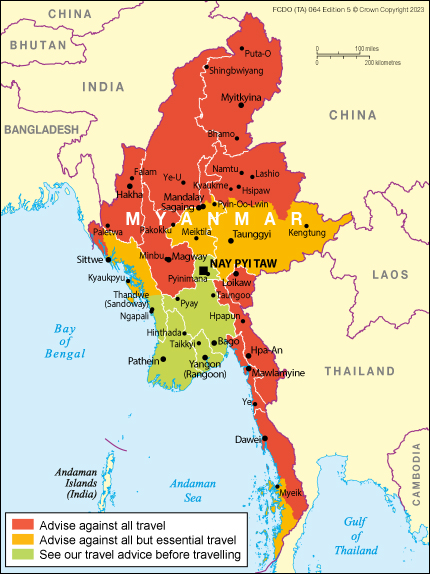Myanmar (Burma)
Summary

The Foreign, Commonwealth and Development Office (FCDO) advises against all travel to:
- The states of:
- Mon
- Kachin
- Chin
- Kayah
- Kayin
- Sagaing and Magway regions
- Northern Rakhine State
- Tanintharyi Region excluding Myeik township, the archipelago and townships south of Tanintharyi Township
- Shan State North
- North Mandalay Region; the townships north of Mandalay City and Pyin Oo Lwin
The Foreign, Commonwealth and Development Office (FCDO) advises against all but essential travel to:
- Shan State South and East
- Mandalay and Southern Tanintharyi Regions
- Central Rakhine State including Sittwe District
The conflictsecurity situation in Myanmar is increasinglyunpredictable volatile, the security situation may deteriorate at short notice. Exercise caution, and considerliable anyto travelchange planswithout carefully.notice.
Across Myanmar there have been significant numbers of violent attacks, including shootings and IEDs since a coup in February 2021. Attacks, including in Yangon and Naypyitaw, primarily continue to target military or regime-affiliated locations such as government buildings and checkpoints, and military-owned businesses. However, attacks may impact civilian bystanders, including in areas regularly frequented by foreign nationals, such as hotels, restaurants, shopping malls and serviced accommodation complexes.
Before you travel, check the ‘Entry requirements’ section for Myanmar’s current entry restrictions and requirements. These may change with little warning. Monitor this advice for the latest updates and stay in contact with your travel provider.
If you plan to pass through another country to return to the UK, check the travel advice for the country you’re transiting.
It is more important than ever to get travel insurance and check it provides sufficient cover. See FCDO guidance on foreign travel insurance.
There is conflict and significant violence across much of Myanmar, involving air strikes, artillery bombardments, landmines and armed clashes. While normal daily life has resumed in many urban centres, armed groups are likely to try to carry out attacks. Shootings and explosions are common, particularly around times of increased political tension. There have been attacks against military personnel, state infrastructure (e.g. police stations, traffic police huts, ward administration centres and electricity company offices), and businesses perceived as affiliated with the military. Areas frequented by foreigners (e.g. lodging/hotels, shopping areas and restaurants) could also be targeted.
There are increasing reports of attacks on the Yangon-Mandalay Expressway and National Highway 1 linking Yangon to Mandalay. For more information see Yangon-Mandalay Expressway.
If you are in Yangon, Naypyitaw, Bago, Ayarwaddy or Southern Rakhine, remain vigilant, exercise caution and seek local advice. You should ensure you are aware of local rules, norms, and restrictions, especially if travelling to townships under martial law. You should seek advice from local tour operators before travelling.
In Yangon, the townships currently under martial law are Hlaing Thayar, Shwe Pyithar, North Okkalapa, North Dagon, South Dagon and Dagon Seakkan, but these are subject to change. See the ‘Safety and security’ page for more details.
There is a small risk to foreigners of arbitrary arrest and detention, though this is much higher for journalists and activists. The criminal justice process followed in such cases falls below international standards. Minor infractions of the law can provide grounds for arrest. Myanmar does not recognise dual nationality.
The authorities in Myanmar are particularly sensitive to all forms of independent reporting and journalistic activity.
Terrorists are likely to try to carry out attacks in Myanmar. You should remain vigilant and follow the advice of local authorities. See Terrorism
The banking sector has seen widespread disruption with many banks closed and some ATMs empty. While higher-end hotels and restaurants do tend to accept card payment, foreign cards are increasingly being declined. Check with your hotel or restaurant that they accept a foreign card. See Money
If you’re abroad and you need emergency help from the UK government, contact the nearest British embassy, consulate or high commission. You should not assume that the FCDO will be able to provide assistance to leave the country in the event of serious unrest or crisis. If you’re arrested or detained, ask police or prison officials to notify the British Embassy immediately.
The Overseas Business Risk service offers information and advice for British companies operating overseas on how to manage political, economic, and business security-related risks.